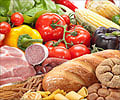A group of Syrian refugee women are learning to translate knowledge of their regional dishes into a marketable skill in the Lebanese capital of Beirut.

For about two months they have been participating in a food skills workship dreamed up by a Lebanese restaurant and financed by the UN's refugee agency UNHCR with help from the Lebanese branch of the Caritas charity.
In a modest basement belonging to Caritas in the Dekwaneh suburb of Beirut, Ibtissam Masto proudly shows off her "monk kibbeh" -- balls of bulghur wheat seasoned with pomegranate molasses that is a speciality of Jisr al-Shughur in northwestern Idlib province.
The petite young woman, wearing a black headscarf, fled several months ago from her home town, which is now better known for violence between rebels and regime troops than its culinary specialities.
"I had a great life in Jisr al-Shughur before the war. I used to sing anasheed (religious songs) during marriages and funerals," says Masto.
"I gave lessons at a religious school and I worked in a pharmacy," she adds, in a voice full of energy.
"The idea of this workshop excited me. I hope I'll be able to make some money."
Participants come from diverse regions including Idlib, northwestern Hasakeh and northern Aleppo provinces.
For Marlene Yukhanna, an Assyrian Christian from Hasakeh, the experience has been a chance to learn Syrian specialities that were new to her.
The 40-year-old mother-of-three can now whip up the Idlib dish of mahshi bulghur -- eggplants stuffed with bulghur and chickpeas -- and kibbeh semmayeh, which uses the spice sumac and hails from Aleppo.
In exchange, she and her friend Nahrain, who both fled Hasakeh three months ago as fighting between Kurds and jihadists there intensified, have been teaching their colleagues their specialties.
Among them is Assyrian kofta, pounded meat mixed with rice, parsley and tomato sauce, and kotal Mosul, a dish of cracked wheat with meat that comes from Iraq, which the Assyrian community was forced to flee in the early 20th century.
Because many dishes are common to cuisines throughout the Levant, the participants have been encouraged to produce only unique regional specialities little seen elsewhere.
"We did the same project previously with Palestinian refugees in Lebanon and it worked very well," said Jihan Shahla of Tawlet Souk al-Tayeb, the Lebanese restaurant behind the project.
"We're helping them have the ability to do something, to have an income, to build a brand image that will allow them to be sought out to cater a wedding, for example," she added.
Every participant carries with them a tale of grief.
"Hasakeh became unbearable in the last few months," said Yukhanna, who has short hair and who sports a white T-shirt.
"The (jihadist) Nusra Front harassed me, demanding that I put on the veil and they destroyed my husband's car. Then there were kidnappings."
Lubana, a 30-year-old mother of eight, cries as she describes the endless bombing that forced her from the town of Maaret al-Numan in Idlib.
"My house is destroyed, my husband has heart problems and my children cry because they aren't going to school in Lebanon," she said.
Like her colleagues, she says the workshop has allowed her "to do something in life".
Reem Azouri, a culinary consultant, oversees the women as they work, instructing them in the standards necessary for a professional cook.
"We have to constantly remind them that they are not cooking for their husband or their children," she smiles.
"They must learn how to store food, how to avoid contamination, how to set the table," she adds.
For Mariam, who fled Aleppo 14 months ago, the real joy of the workshop is the "mini-Syria" it has created.
"It's very beautiful. I feel that I'm at home, in my Syria."
Source-AFP
 MEDINDIA
MEDINDIA




 Email
Email




